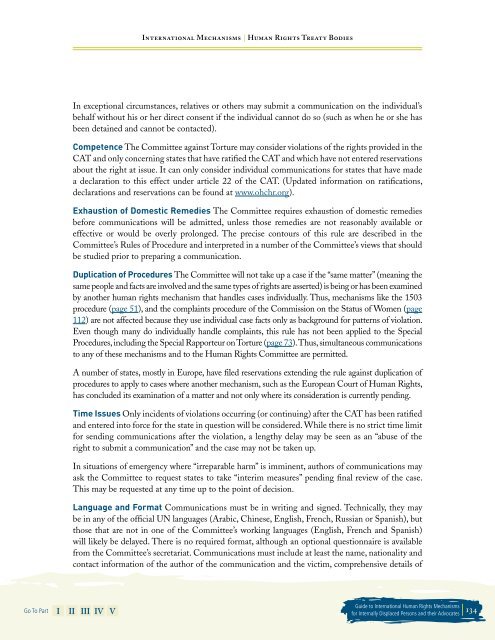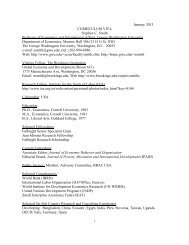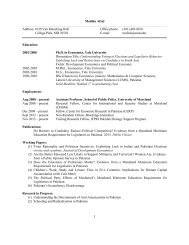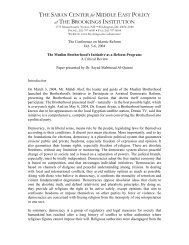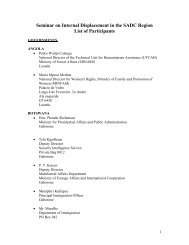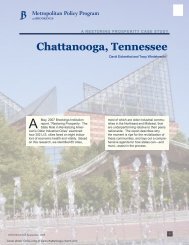Guide to International Human Rights Mechanisms - Brookings
Guide to International Human Rights Mechanisms - Brookings
Guide to International Human Rights Mechanisms - Brookings
Create successful ePaper yourself
Turn your PDF publications into a flip-book with our unique Google optimized e-Paper software.
Go To Part I II III IV V<br />
<strong>International</strong> <strong>Mechanisms</strong> | <strong>Human</strong> <strong>Rights</strong> Treaty Bodies<br />
In exceptional circumstances, relatives or others may submit a communication on the individual’s<br />
behalf without his or her direct consent if the individual cannot do so (such as when he or she has<br />
been detained and cannot be contacted).<br />
competence The Committee against Torture may consider violations of the rights provided in the<br />
CAT and only concerning states that have ratified the CAT and which have not entered reservations<br />
about the right at issue. It can only consider individual communications for states that have made<br />
a declaration <strong>to</strong> this effect under article 22 of the CAT. (Updated information on ratifications,<br />
declarations and reservations can be found at www.ohchr.org).<br />
exhaustion of Domestic remedies The Committee requires exhaustion of domestic remedies<br />
before communications will be admitted, unless those remedies are not reasonably available or<br />
effective or would be overly prolonged. The precise con<strong>to</strong>urs of this rule are described in the<br />
Committee’s Rules of Procedure and interpreted in a number of the Committee’s views that should<br />
be studied prior <strong>to</strong> preparing a communication.<br />
Duplication of Procedures The Committee will not take up a case if the “same matter” (meaning the<br />
same people and facts are involved and the same types of rights are asserted) is being or has been examined<br />
by another human rights mechanism that handles cases individually. Thus, mechanisms like the 1503<br />
procedure (page 51), and the complaints procedure of the Commission on the Status of Women (page<br />
112) are not affected because they use individual case facts only as background for patterns of violation.<br />
Even though many do individually handle complaints, this rule has not been applied <strong>to</strong> the Special<br />
Procedures, including the Special Rapporteur on Torture (page 73). Thus, simultaneous communications<br />
<strong>to</strong> any of these mechanisms and <strong>to</strong> the <strong>Human</strong> <strong>Rights</strong> Committee are permitted.<br />
A number of states, mostly in Europe, have filed reservations extending the rule against duplication of<br />
procedures <strong>to</strong> apply <strong>to</strong> cases where another mechanism, such as the European Court of <strong>Human</strong> <strong>Rights</strong>,<br />
has concluded its examination of a matter and not only where its consideration is currently pending.<br />
Time issues Only incidents of violations occurring (or continuing) after the CAT has been ratified<br />
and entered in<strong>to</strong> force for the state in question will be considered. While there is no strict time limit<br />
for sending communications after the violation, a lengthy delay may be seen as an “abuse of the<br />
right <strong>to</strong> submit a communication” and the case may not be taken up.<br />
In situations of emergency where “irreparable harm” is imminent, authors of communications may<br />
ask the Committee <strong>to</strong> request states <strong>to</strong> take “interim measures” pending final review of the case.<br />
This may be requested at any time up <strong>to</strong> the point of decision.<br />
language and format Communications must be in writing and signed. Technically, they may<br />
be in any of the official UN languages (Arabic, Chinese, English, French, Russian or Spanish), but<br />
those that are not in one of the Committee’s working languages (English, French and Spanish)<br />
will likely be delayed. There is no required format, although an optional questionnaire is available<br />
from the Committee’s secretariat. Communications must include at least the name, nationality and<br />
contact information of the author of the communication and the victim, comprehensive details of<br />
<strong>Guide</strong> <strong>to</strong> <strong>International</strong> <strong>Human</strong> <strong>Rights</strong> <strong>Mechanisms</strong><br />
for Internally Displaced Persons and their Advocates 1


